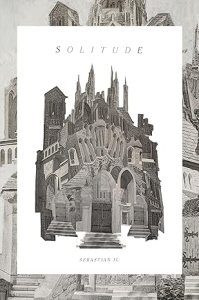Synopsis:
A young girl lives her day-to-day life in a post-apocalyptic world, confined entirely within the crumbling remains of an old church—the last refuge for a small band of survivors. She is the only child among them, and the wasteland beyond remains a mystery, known only through her daydreams and fleeting glimpses through boarded-up windows and broken towers.
Her story begins with the unexpected death of a fellow survivor—the first loss she has ever known. As grief ripples through the group, their fragile sense of safety begins to fray. Through the girl’s eyes, we see the adults around her struggle to maintain a semblance of normal life and offer her something like a true childhood, even as the dangers of the outside world press ever closer.
Solitude is a novella about found family, survival, and loss, seen through the eyes of a young girl as she tries to understand and come to terms with a world that is ultimately too big, too dangerous, and too indifferent.
Favorite Lines:
“Her world was larger up here; there was more room for possibility and imagination.”
“It was the forever part that was hard to handle. the permanence of it. The idea that someone she had known her whole life, who was always there, was gone. It was hard to think about it. Maybe this is the weight that everyone was feeling all the time. The weight of people being gone, of their lives being different forever.”
“And then she noticed it. Illuminated perfectly in the twilight, the smallest bit of green. A green that she had only seen in books and old pictures.”
My Opinion:
I received a copy of this book from the author in exchange for my honest opinion.
Sebastian JC’s Solitude follows a young girl growing up in the ruins of a church after societal collapse, where a small group of survivors struggles to endure hunger, grief, and the dangers of the outside world. Told through her observant and reflective perspective, the novel highlights the fragile dynamics of a chosen family, the cycles of daily survival, and the weight of loss.
What surprised me most about Solitude is how intimate the story feels despite its post-apocalyptic setting. It would be easy for a novel like this to lean heavily on destruction and despair, but instead, JC builds the world around one young girl’s perspective, grounding the collapse of society in the quiet moments of her everyday life. From her perch in the ruined church steeple to her careful observations of the makeshift family she lives with, the novel is less about explosions and chaos and more about survival through relationships, memory, and the fragile bonds that hold people together.
The writing style is deliberate and unhurried, mirroring the rhythms of camp life. Long passages describe the girl’s walks through ruined hallways, her habit of counting steps, or the way dust filters through stained glass. This might sound slow, but it works; the detail makes you feel like you’re inhabiting her world, and it underscores how, in a life defined by scarcity, attention to small things is survival itself. You begin to see the church and its ruins as she does: not just broken stone and wood, but a place mapped in memory, danger, and imagination.
I also appreciated how the book weaves grief into its structure. The loss of Jav early on is not a plot twist but a weight that echoes through every chapter. Each character absorbs it differently—John through silence and illness, Sandra through relentless caretaking, and the girl through restless wandering and reflection. JC shows how in survival, grief is never private; it seeps into the entire group, shaping decisions, tensions, and fleeting moments of tenderness.
At times, the book risks feeling repetitive—another patrol, another climb, another whispered conversation in the ruins—but I came to see that repetition as intentional. The girl’s world is claustrophobic, defined by cycles of watchfulness and waiting. That narrow focus made the rare bursts of danger or connection stand out all the more. By the end, what lingered with me wasn’t the bleakness of the world outside but the fragile hope inside: the idea that even in ruin, meaning is built in relationships, in ritual, and in holding onto stories of who we are.
Summary:
Overall, Solitude blends post-apocalyptic tension with quiet, detailed storytelling. It becomes less about destruction and more about memory, resilience, and the search for belonging in a fractured world. If you like post-apocalyptical sci-fi and coming-of age stories, then this book could be for you. Happy reading!
